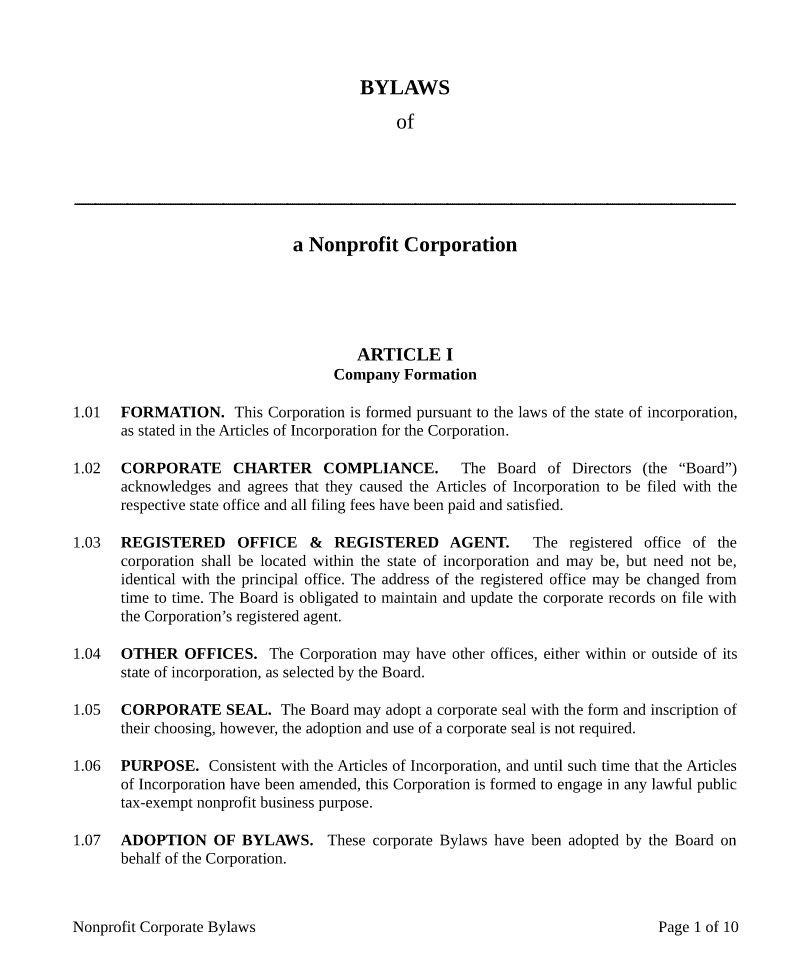Utah Nonprofit Bylaws
Utah nonprofit bylaws are a guidebook that detail how to manage your nonprofit’s operations. Your bylaws may contain any rule or procedure that does not contradict the state legal statutes or your own Articles of Incorporation.
Drafting your bylaws can be tricky. That’s why we had our attorney create a template you can use for free to start drafting your nonprofit bylaws.
Why does a Utah nonprofit need bylaws?
Unlike your Utah Nonprofit Articles of Incorporation, your nonprofit bylaws are internal documents, which means you don’t need to submit to the state. So why should you even write bylaws? Your bylaws include the procedures for how to respond to emergencies and changes within your nonprofit, so well-written bylaws can help you move swiftly and confidently into any situation. Here are three more reasons why having bylaws is important.
1. Nonprofit bylaws are highly encouraged in Utah.
At their core, your bylaws are a how-to manual for managing your nonprofit—they help you by giving your board of directors a list of rules and regulations to follow as complicated situations pop up. You can have an agreed-upon list of processes for things like adding new board members, handling conflicts of interest, and compensating directors.
Though not legally required according to UT Code § 16-6a-206 (2017), we highly recommend that your nonprofit adopts bylaws.
2. Third parties will ask to see your bylaws.
Though the state won’t ask to see your Utah nonprofit bylaws, you might be asked to share your bylaws with other third parties. Banks, for example, will require proof of who is allowed to open a bank account on the nonprofit’s behalf—your bylaws work for this. Donors might also ask for your bylaws before deciding to donate to your nonprofit.
Importantly, if you decide to apply for 501(c)(3) tax-exempt status with the IRS, bylaws will be required. You will need to attach your bylaws to your IRS application.
3. Nonprofit bylaws allow you more control over your nonprofit.
Since bylaws give your board of directors operating processes for important procedures like holding votes and dissolving your nonprofit, your bylaws can help prevent disputes. Without bylaws, you are more likely to face an issue, such as a lawsuit, and end up in court. This ultimately takes control away from you and your nonprofit.
Want to learn more? Check out our Guide to Nonprofits.
What do Utah Nonprofit Bylaws include?
Bylaws for your Utah nonprofit can include anything that does not go against state legal statutes, but strong bylaws will include basic information like business purpose, address, and board of directors—as well as processes for how to run your nonprofit smoothly. A few of these processes include:
- adding board members
- removing board members
- holding a vote
- handling conflicts of interest
- compensating directors
- starting committees
- amending the bylaws
- dissolving the nonprofit
Are nonprofit bylaws legally binding?
Yes. Your bylaws, once adopted, are legally binding for your nonprofit and all those acting on its behalf. Your nonprofit, as well as those acting on its behalf, could face legal consequences if they do not abide by your bylaws.
Are nonprofit bylaws public record?
Sometimes. Bylaws are an internal document, but you may choose to make them public by applying for 501(c)(3) tax-exempt status. The process for applying to be tax-exempt includes an application where you attach your bylaws. The IRS makes all of this public information.
FAQs
Your bylaws will be legally binding regardless of board signatures. Still, we recommend you have them signed. Signing your nonprofit bylaws makes sure that everyone is up-to-date with what is legally required from the nonprofit from the start, and it’s standard practice.
Yes. Your bylaws can—and in some cases should—be amended! As your nonprofit grows and changes, your bylaws will need to be tweaked or expanded to stay consistent with your current operations. The process for amending your bylaws should be in the bylaws themselves.
At your first organizational meeting, your board of directors (or incorporators) should adopt your bylaws.
